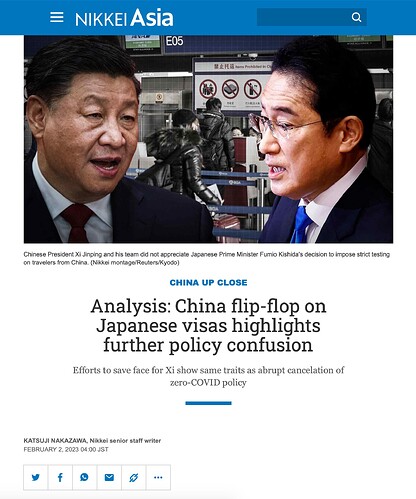-
中国已经恢复向日本公民发放普通签证,结束了为期三周的签证冻结。
-
这一消息是在中国驻日本大使馆的官方网站上宣布的。
-
签证冻结是在日本加强对来自中国的入境者的边境管制后由中国政府实施的。
-
恢复签证发放标志着两国之间双边关系的改善。
-
1月8日,日本加强了对来自中国大陆的旅行者的检测要求,包括需要出示在出发前72小时内获得的阴性PCR检测结果证明。
-
两天后,中国暂停向日本旅行者发放一般签证,尽管日本没有像韩国那样对中国公民实施全面的签证禁令。
-
日本向中国提出抗议,认为北京的举措缺乏 “对等性”。
-
周一,在东京江东区的中国签证申请服务中心,可以看到一条长长的队伍。
-
排队的人中有商人,他们终于可以恢复到大陆旅行,也有在中国出生的归化日本人,他们期待着回家探亲,现在检疫要求已经取消。
-
在北京突然放弃对日本进口商品的三周禁令后,中日关系有所改善。
-
大使馆网站上的公告没有解释这一决定,让人们感到不解。
-
这种突然的逆转与中国对COVID的处理有相似之处,尽管有负面影响,但还是维持了三年。
-
零COVID政策和对日本的报复都是出于为中国共产党及其领导人习近平主席挽回面子的愿望。
-
中日关系的改善可能表明,中国政府对其邻国采取了更加开放和宽容的态度。
-
2020年10月,中国国家主席习近平在中国共产党全国代表大会召开之前,试图将中国对COVID-19的遏制描述为一个巨大的成功。
-
最初,这种新的冠状病毒在湖北省武汉市疯狂传播,但中国并没有阻止其公民出国旅行。
-
零冠状病毒政策得以实施,但对高传染性的奥秘克容变种缺乏有效的力量。
-
这项政策给中国经济带来了前所未有的打击,并引发了公众的反弹,特别是在年轻女性和无法找到工作的人中。
-
这种挫折感在大学校园和全国主要城市的示威活动中达到高潮。
-
中国的领导班子得出结论,坚持零COVID政策可能会使党的统治处于危险之中,导致决定放弃该政策。
-
专制统治的悲剧在于,它不能公开对如何作出决定作出详细和令人信服的解释。
-
如果事情失去控制,该党和最高领导人可能要为保持近三年的零COVID负责。日本的边境管制。
-
日本首相岸田文雄有责任向公众解释为什么日本要求对来自中国的旅行者进行更严格的检测。
-
岸田在措施实施前公开提到了这些措施,北京方面认为这是一种敌对行为。
-
这被认为是对刚刚进入第三任期的习近平的侮辱。
-
2023年初,中国和日本之间发生了外交争端,起因是日本决定要求对来自中国的旅行者进行严格的检测,以应对取消零COVID政策后COVID病例的激增。中国的回应是实施签证禁令,很可能是为了表示对习近平的考虑。最后,随着中国新年假期的结束,这一争端也告一段落,因为双边关系如此冷淡并不符合中国的利益。争端的根源是中国在三年前无法停止海外旅行,世界卫生组织批评中国政府对病例和死亡的报告不足。
-
大阪的热门旅游景点道顿堀正准备迎接一波中国游客,一家鱼贩正在进行大规模整修。
-
在京都的伏见稻荷大社,中国人还没有大规模返回,在那里听到的外语主要是韩国和东南亚的语言。
-
中国外交部发言人毛宁表示,中国愿意与所有国家合作,放宽正常的跨境旅行,同时强调不要将COVID的应对措施政治化,反对针对中国的歧视性限制。
-
中日交流正常化是双方的愿望,但许多日本人质疑哪一方在将COVID对策政治化。
-
China has resumed issuing general visas to Japanese citizens, ending a three-week visa freeze.
-
The announcement was made on the official website of the Chinese embassy in Japan.
-
The visa freeze was imposed by Beijing after Japan tightened its border controls for arrivals from China.
-
The resumed visa issuance signals an improvement in bilateral relations between the two countries.
-
On Jan. 8, Japan strengthened testing requirements for travelers coming from mainland China, including the need to show proof of a negative PCR test result obtained within 72 hours of departure.
-
Two days later, China suspended the issuance of general visas to Japanese travelers, though Japan had not imposed a blanket ban on visas for Chinese nationals like South Korea did.
-
Japan lodged a protest with China, arguing that Beijing’s move lacked “reciprocity.”
-
On Monday, a long queue could be seen at the Chinese Visa Application Service Center in Tokyo’s Koto Ward.
-
People in line were businesspeople, finally able to resume travel to the mainland, as well as Chinese-born naturalized Japanese looking forward to visiting family back home, now that quarantine requirements had been lifted.
-
Sino-Japanese relations have improved after Beijing abruptly dropped a three-week ban on Japanese imports.
-
The announcement on the embassy website did not explain the decision, leaving people puzzled.
-
The sudden reversal has similarities to China’s handling of COVID, which was maintained for three years despite the negative effects.
-
Both the zero-COVID policy and retaliation against Japan are driven by a desire to save face for the Chinese Communist Party and its leader, President Xi Jinping.
-
The improved Sino-Japanese relations could be an indication of a more open and tolerant attitude by the Chinese government towards its neighbors.
-
In October 2020, Chinese President Xi Jinping sought to portray China’s containment of COVID-19 as a resounding success ahead of the Chinese Communist Party’s national congress.
-
Initially, the new coronavirus was spreading like wildfire in Wuhan, Hubei Province, but China did not prevent its citizens from travelling abroad.
-
The zero-COVID policy was implemented but lacked effective power against the highly infectious omicron variant.
-
This policy delivered an unprecedented blow to the Chinese economy and sparked public backlash, particularly among young women and those unable to find employment.
-
This frustration culminated in demonstrations on university campuses and major cities across the nation.
-
China’s leadership team concluded that sticking with zero-COVID policy could put party rule in jeopardy, leading to the decision to abandon the policy.
-
The tragedy of authoritarian rule is that it cannot publicly give a detailed and convincing explanation about how the decision was reached.
-
The party and top leader could be held accountable for keeping zero-COVID in place for nearly three years if things got out of hand. Japan’s Border Controls:
-
Japanese Prime Minister Fumio Kishida had a responsibility to explain to the public why Japan was requiring stricter testing for travelers from China.
-
Kishida publicly referred to the measures before they were implemented, which Beijing took as hostile.
-
This was seen as an insult to Xi, who had just entered his third term.
-
diplomatic dispute between China and Japan in early 2023, which began with Japan’s decision to require strict testing for travelers from China in response to the explosion of COVID cases after the cancelation of the zero-COVID policy. China responded by imposing a visa ban, likely as a way to show consideration to Xi Jinping. In the end, the dispute was brought to a close as the Chinese New Year holidays drew to a close, as it was not in China’s interest for bilateral ties to be so chilly. The root of the dispute was China’s inability to halt overseas travel three years prior, and the World Health Organization has criticized the underreporting of cases and deaths by the Chinese government.
-
Osaka’s popular tourist destination of Dotonbori is preparing for a wave of Chinese visitors with a fishmonger undergoing a major refurbishment.
-
At Kyoto’s Fushimi Inari Taisha, Chinese have not returned en masse and the foreign languages heard there are primarily Korean and Southeast Asian.
-
Chinese Foreign Ministry spokesperson Mao Ning said the country is ready to work with all countries to ease normal cross-border travel, while stressing against politicizing the COVID response and against discriminatory restrictions targeting China.
-
Normalization of Sino-Japanese exchanges is the wish of both sides, but many Japanese are questioning which side is politicizing the COVID response.
链接:Analysis: China flip-flop on Japanese visas highlights further policy confusion - Nikkei Asia
